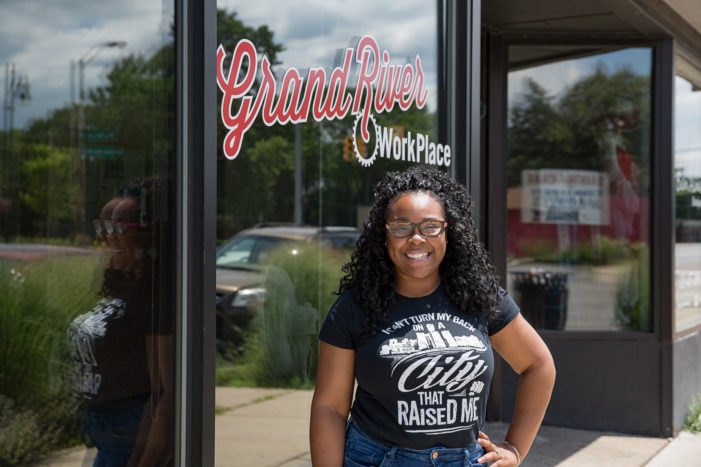There is no doubt about it. Small shops in Detroit are cool, and thriving.
What so many don’t know is many of these small shops have been operating in our city’s neighborhoods for years. Others are quietly opening new businesses that will make a difference to residents. Many of those small shops are invisible, never getting the media coverage some more prominent businesses with larger budgets or networks enjoy.
We, at TheHUB Detroit, believe it is time for these “been ups” and “up and comers” to be recognized for their perseverance and commitment to the ongoing economic development in their neighborhoods and our city.
That’s why we launched our Small Shops series in partnership with Bank of America. We want to give you, our readers, a chance to meet these too-often-invisible owners, learn the secrets of their success, and why they continue to play a critical role in Detroit’s resurgence.

These companies found a niche, filled it and created successful businesses that pumped up their neighborhoods and, in turn, Detroit.
Take for example the Carniceria Guadalajara butcher shop in the Springwells neighborhood of Southwest Detroit. Owner Salvador Enriquez came to Detroit in 1999, bringing with him the butchery skills he learned in his native of Guadalajara along with a commitment he learned from his grandmother – give the best food possible to the people. When he arrived he found out there wasn’t a single butcher shop in Southwest Detroit. There was a niche for him to fill. He started out small. Seventeen years later, what began as an eight-foot counter and a dream is now Carniceria Guadalajara, a part of the ever-growing Southwest Detroit neighborhood.

Or look at Public Lumber & Millwork Co., a family-owned specialty woodwork business that has served the community and Detroit since 1927. Unlike the big stores like Home Depot, the company focuses on selling manufacturing wood products such as moldings, doors, hardwood decking and plywood and duplicating old wood pieces brought in by customers. As Craig Sarafa, its general manager, says “(It’s) not a very common thing. Probably only a handful of companies in the whole state are doing it.”
In the 90 years Public Lumber & Millwork has been in business its family business atmosphere has kept the store open. As Sarafa puts it, “It kind of takes a family business where you’re much more invested in making things work out than you might otherwise be, in order to survive these obstacles. (That’s) something you won’t find in a chain business.”

You’ll find the same family atmosphere at Hot Sam’s, a fashionable men’s store at the One Campus Martius in downtown Detroit that opened its doors in 1921. It weathered the Depression, customer migration to shopping malls and Detroit’s own economic downtown because of its excellent service. It wasn’t easy. “We went through some tough years. If we weren’t a destination store with second, third and fourth generation customers we could have been in trouble,” says Cliff Green, who along with Tony Stovall, bought the store from its original owner Sam Friedman in 1994.
Again, they found a niche and worked hard to keep filling it as tastes change. They canvass new employees working downtown to find their taste and entertainment habits so the store stacks the right merchandise.
Marilyn Nash Yazbeck opened Nottingham Pharmacy on East Warren nearly a quarter of a century ago. Her business deals only with writing prescriptions and working with insurance companies, unlike pharmacies that sell other products, such as snack foods. The growth of national chains has not caused her any worry. Her customers are loyal and her store is within walking distance of many residents making it easy to fill a prescription.

Over on West McNichols Road in the Bagley neighborhood Jevona Watson will realize her dream and soon open a Detroit Sip. It will offer an assortment of coffee, tea, hot chocolate, and cold beverages, as well as locally manufactured products like Dutch Girl Donuts, Towne Club soda, Faygo drinks, and Better Made potato chips, plus cookies, brownies, and soups.
The Bagley community is served by Live6 Alliance, a nonprofit planning and development organization that represents the interests of about 50,000 residents in eight neighborhoods along Livernois Avenue and McNichols (Six Mile) Road. Live6 Co-director Lauren Hood says there is demand for a business at Detroit Sip’s site, particularly for a place where people can get together with colleagues or neighbors. Not only will the store fill a niche, it will serve as a beacon attracting others to the neighborhood.

These five businesses are just a sampling of small, independent shops that found their niche. Those with a history settled in, earned the respect of the neighborhoods and served their community through good times and bad.Those who are realizing their dreams of opening an independent store plan to do the same.
“Small business is the engine that drives Detroit’s economy and vibrancy, and its diversity is why we partnered with TheHUB,” says Tiffany Douglas, Bank of America market manager. “Knowing about these assets in our neighborhoods, ones that line the streets with jewels, food, hand crafted items and services, make Detroit’s small business landscape unique and worth highlighting and celebrating. TheHUB’s Small Shops series does just that for residents and interested parties.”
We are proud to bring you more of their stories. They deserve to be celebrated. All of us can learn from their grit and drive to be successful.
To see more of TheHUB’s Small Shops coverage, click here.
Editor’s Note: Marge Sorge is the managing editor of TheHUB.

Lead photo: Grand River WorkPlace Director Larissa Carr heads a very successful business incubator credited for helping small businesses move from pop-ups to sustainable store fronts. Photo by Michelle & Chris Gerard.


